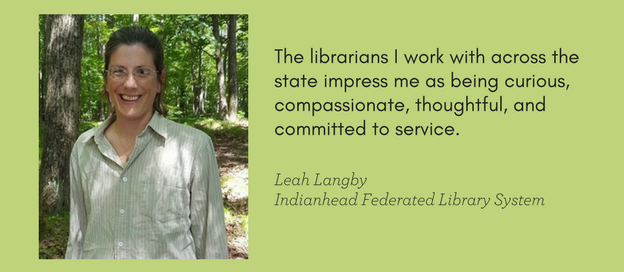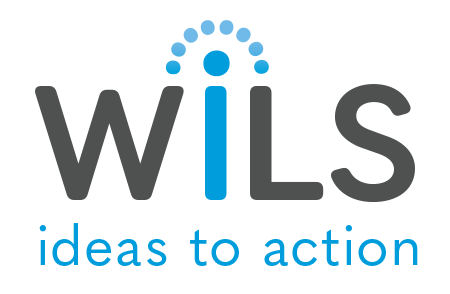
One of our greatest joys at WiLS is hearing our members tell the stories of the big and important work they are doing – interesting new projects or initiatives, or even interesting and new approaches to old projects. And, in addition to hearing about it, it makes us even happier when we can share those stories with other members. Each month, WiLS is proud to feature an interview with one of our library members. This month, we interview Leah Langby, Library Development and Youth Services Coordinator at Indianhead Federated Library System.
Why did you, personally, choose to work in libraries?
The year after I graduated from college, I was working at a community-based literacy program in Washington, DC. I worked with neighborhood branch librarians on a few projects and saw what the public library was doing to help adult learners and their families. I had an epiphany! The way to put together many things I cared about (children and families, literacy, equitable access to information and resources) was to become a youth services librarian. I’ve never regretted it. I’m still passionate about that stuff, plus a whole bunch of other things that make me feel like my job is exciting and worthwhile!
What is unique about the culture of your member libraries? How do you influence it?
The librarians I work with across the state impress me as being curious, compassionate, thoughtful, and committed to service. I think there is a can-do attitude among the librarians in our system and a real generosity with each other. I certainly see that among my colleagues who work at IFLS, too. I feel like some of the most important things I do are helping connect people with each other in various ways, and trying to nudge us all to think more about how to make libraries more inclusive.
What do you think is important to know about the community you work with? What helps you understand their needs?
It is important to always strive to understand the needs, interests, challenges, concerns, and aspirations of the whole community—everyone, not just the people who are already coming into the library. Listening, working with partners, delving into demographic data, paying attention, and using some of the tools from the Harwood Institute’s Libraries Transform project have all been effective for me. Such an important question—I’m sure I’m leaving something out!
What big ideas are being worked on at your library? What problems are being solved?
It’s hard to pick, but I’m working on two projects right now, with the invaluable help of some librarians in our system, that I’m especially excited about.
The first: helping libraries be more equipped to serve people who are income insecure. This fall, a core group of librarians from around the system will train to be trainers to provide in-services and coaching to other libraries in the system about poverty awareness, and also to defuse difficult situations before they become a crisis. We are also examining policies to determine barriers they create for people who are income insecure and helping library staff and directors advocate for changing those policies.
The second project is more modest—I’m working with staff from three libraries to put together some Civics Lab kits—ideas, resources, and information to allow people of all ages and opinions to come together and talk about challenging and potentially divisive issues in a way that helps build understanding. We’re still working on the details, but I’m excited to delve into this, and I think it will be a useful tool for libraries (and communities) across our system and state.
——————
These interviews are part of a series of interviews with both WiLS library and vendor partners. Your feedback is appreciated. If you have any to offer on this article, or suggestions for upcoming interviews, contact Andrea Coffin at acoffin@wils.org.
